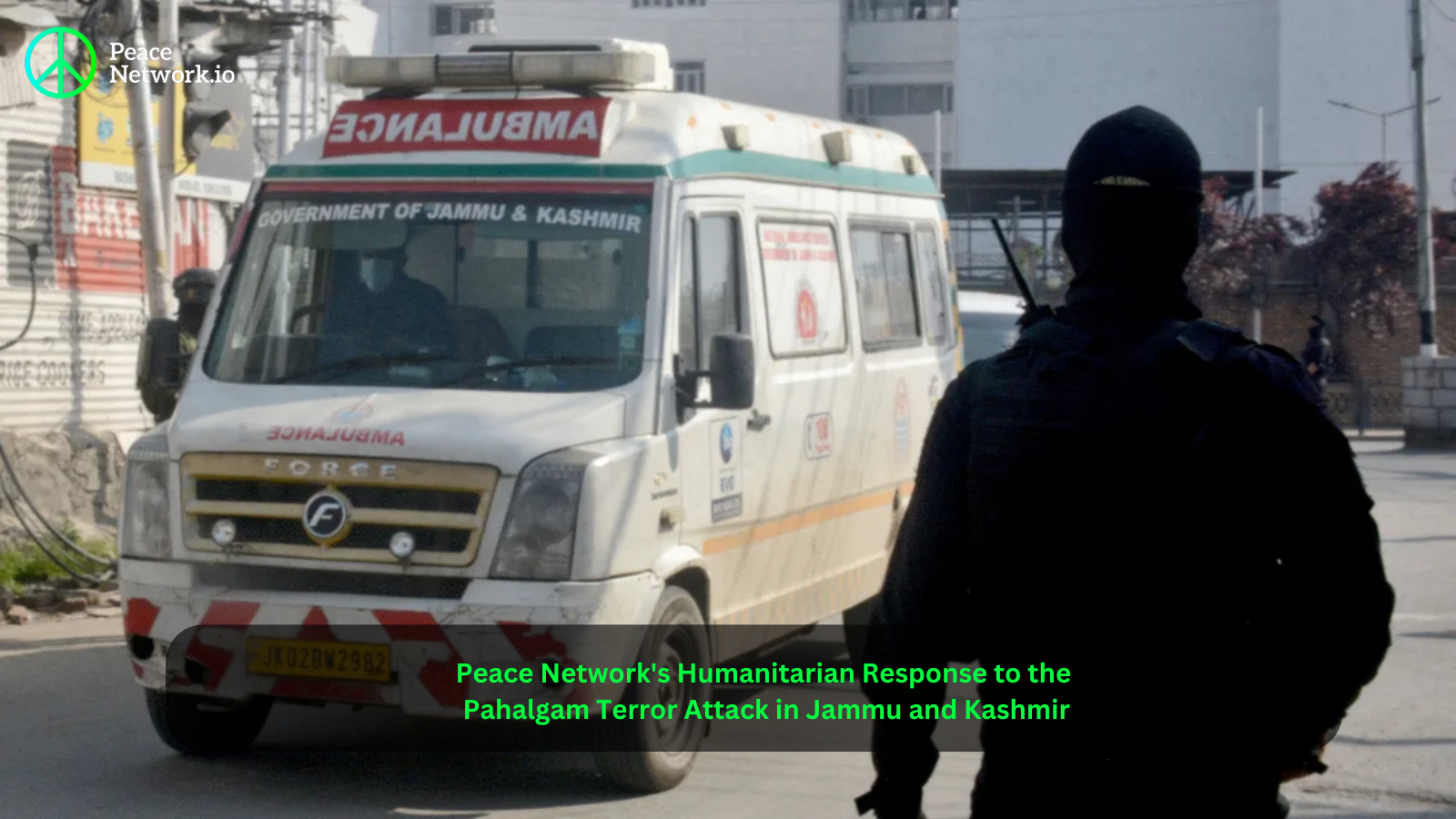Peace Network's Humanitarian Response to the Pahalgam Terror Attack in Jammu and Kashmir

A Deadly Day in Pahalgam
On April 22, 2025, tragedy struck the serene landscape of Pahalgam in Jammu and Kashmir, a region long shadowed by political unrest. A brutal terrorist assault claimed the lives of 28 people—both Indian citizens and foreign tourists—marking one of the deadliest incidents in the region in recent years. Carried out by militants from The Resistance Front (TRF), an affiliate of Lashkar-e-Taiba, the attack deliberately targeted civilians in one of the most popular and peaceful corners of Kashmir. The act, rooted in opposition to ongoing demographic shifts in the region, sparked outrage and grief across the globe.
An ambulance carrying the bodies of tourists killed in a suspected militant attack near Pahalgam, in Indian-controlled Jammu and Kashmir, arrive at the police control room in Srinagar on April 23, 2025.
Shockwaves Across the Globe
The gravity of the attack rippled far beyond India’s borders. Leaders including Prime Minister Narendra Modi and Home Minister Amit Shah voiced strong condemnation, while international figures—from U.S. Vice President J.D. Vance to former President Donald Trump—issued heartfelt messages of solidarity. The incident has once again stirred global concern about the fragility of peace in South Asia, where violence continues to disrupt everyday life.
Peace Network Steps In
In the aftermath of such devastation, while governments deliberate on policy and security responses, it is often humanitarian organizations that step in to address the urgent needs of the victims. One such actor is Peace Network, a global charity leveraging the power of blockchain technology to support communities in crisis. With a presence in over 50 countries, Peace Network operates at the intersection of innovation and compassion, deploying aid where it's needed most—and doing so with transparency, speed, and integrity.
Residents shout slogans during a protest in Srinagar, in Jammu and Kashmir on April 23
Rapid Relief, Powered by Blockchain
Following the Pahalgam tragedy, Peace Network quickly mobilized its resources to provide essential relief to survivors and affected families. Their response encompassed the delivery of emergency food supplies, shelter materials, medical aid, and trauma support services. What sets Peace Network apart is their use of blockchain infrastructure, which ensures that every donation and transaction is tracked, verified, and free from bureaucratic inefficiencies or corruption. In volatile environments like Kashmir, this means aid reaches those in need without delay or diversion.
From Emergency Relief to Long-Term Recovery
But Peace Network's mission goes beyond reactive assistance. Their work in conflict zones focuses on long-term recovery—helping rebuild communities, support displaced families, and lay the groundwork for resilience in the face of ongoing instability. Whether it’s restoring livelihoods or integrating modern financial tools through crypto-based microgrants, the organization equips communities with tools to regain control over their futures.
A man who was injured in the attack receives treatment in a hospital in the mountainous Anantnag district on April 22
Peace and Love as a Guiding Light
At its heart, Peace Network operates with a simple yet profound mission: peace and love. That mission fuels everything from their blockchain-powered operations to their grassroots presence on the ground. In Kashmir, it translated into real, tangible help at a time when grief threatened to paralyze an entire community.
The Bigger Picture: Innovation in Humanitarian Aid
The Pahalgam attack is a stark reminder that, in many corners of the world, safety and security remain elusive dreams. In such times, the role of humanitarian organizations becomes more than just support—it becomes a symbol of hope. Peace Network is part of a growing wave of next-generation NGOs redefining how charity is done. Their use of technology isn’t just a gimmick; it’s a game-changer, ensuring transparency, reducing waste, and building trust among donors and beneficiaries alike.
Security personnel patrol a street the morning after the attack in Jammu and Kashmir on April 23
A Call for Global Solidarity
As the world grapples with rising conflict and division, the need for global solidarity has never been greater. Political solutions may take time, but humanitarian relief cannot wait. The example set by Peace Network in Kashmir shows us what’s possible when compassion meets innovation. And in a world that often feels fractured, it’s efforts like these that quietly, persistently, stitch it back together—one act of love at a time.

